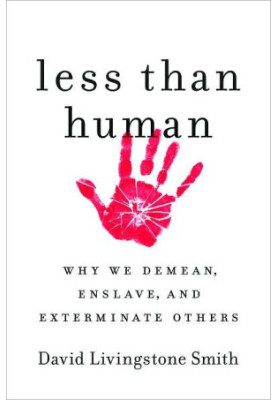Less Than Human: Why We Demean, Enslave, and Exterminate Others
 Instant download
Instant download
after payment (24/7)
 Wide range of formats
Wide range of formats
(for all gadgets)
 Full book
Full book
(including for Apple and Android)
Winner of the 2012 Anisfield-Wolf Book Award for NonfictionA revelatory look at why we dehumanize each other, with stunning examples from world history as well as today’s headlines“Brute.” “Cockroach.” “Lice.” “Vermin.” “Dog.” “Beast.” These and other monikers are constantly in use to refer to other humans—for political, religious, ethnic, or sexist reasons. Human beings have a tendency to regard members of their own kind as less than human. This tendency has made atrocities like the Holocaust, the genocide in Rwanda, and the slave trade possible, and yet we still find it in phenomena such as xenophobia, homophobia, military propaganda, and racism.Less Than Humandraws on a rich mix of history, psychology, biology, anthropology and philosophy to document the pervasiveness of dehumanization, describe its forms, and explain why we so often resort to it.David Livingstone Smith posits that this behavior is rooted in human nature, but gives us hope in also stating that biological traits are malleable, showing us that change is possible.Less Than Humanis a chilling indictment of our nature, and is as timely as it is relevant.From Publishers WeeklySmith (The Most Dangerous Animal), cofounder and director of the Institute for Cognitive Science and Evolutionary Psychology at the University of New England, interrogates why man alone, in Mark Twain's words, can go "forth in cold blood and calm pulse to exterminate his kind." Smith explores the ancient practice of labeling rival tribes; specific ethnic, racial, or religious groups; and species as undeserving of compassion. He is intent on untangling the mystery of dehumanization: it's insufficient to merely demonize the criminals, he argues; we must understand why, say, the Nazis believed they had a "moral duty" to annihilate the Jews. He looks into possible biological bases, psychological and developmental roots, clues in paleolithic art, and how, over the ages, philosophers and artists have criticized or goaded on the practice. Vivid and horrifying examples of incidences (and consequences) of the harassment, torture, and extermination of certain groups saturate the book—from the European decimation of indigenous peoples in the Americas to Israeli soldiers' attacks on Palestinian children. Smith's compelling study and his argument that the study of dehumanization be made a global priority to prevent future Rwandas or Hiroshimas is well-made and important. (Mar.)(c) Copyright PWxyz, LLC. All rights reserved.Review"Smith's compelling study and his argument that the study of dehumanization be made a global priority to prevent future Rwandas or Hiroshimas is well-made and important." --Publishers Weekly“In this powerful and original work—ranging widely and with impressive interdisciplinary scope over different epochs and cultures while remaining compellingly readable—David Livingstone Smith demonstrates that our practice of representing our fellow-humans as subhuman is both inhuman and all too human. He forces us to recognize that monstrous atrocities are routinely carried out not by monsters but, alas, by ourselves.” -Charles W. Mills, Ph.D. author ofThe Racial Contract,John Evans Professor of Moral and Intellectual Philosophy“David Livingstone Smith produces a clear and illuminating vision of why human beings are the way we are and how we got this way. The scholarship is broad, the insight is deep and the prose is compelling.Less Than Humanwill change the way you think about things that matter profoundly. This is dazzling stuff.”-- Steven E. Landsburg, Ph.D., author ofThe Big Questions“Warning: This book will challenge you! Not that it’s hard to understand -- in fact, it's wonderfully accessible -- but it raises some terrible realities. For this reason, it is all the more important that you readLess that Human. It is brilliantly written, carefully researched, and a wonderful and much-needed opportunity for us to explore what it might mean to be ‘truly human’.” -- David P. Barash, author ofPayback: Why We Retaliate, Seek Revenge and Redirect Our Aggression"This is a beautiful book on an ugly topic. David Livingstone Smith uses the newest research in cognitive science to address the problems of racism, genocide, and atrocity, presenting a provocative theory as t...
LF/827106/R
Data sheet
- Name of the Author
- David Livingstone Smith
- Language
- English
- ISBN
- 9781429968560
- Release date
- 2011

















